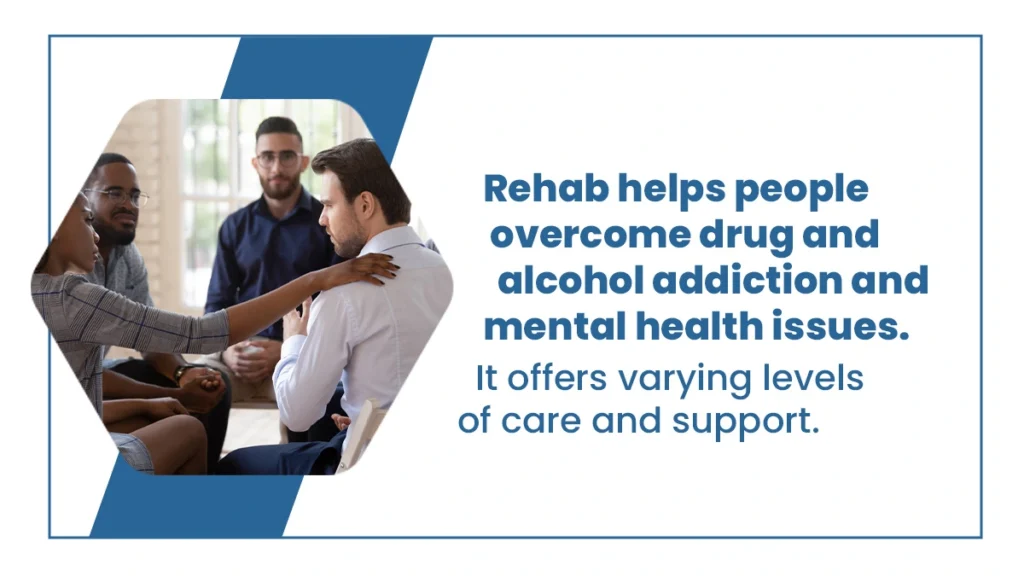
Rehab is a treatment process that helps people recover from various physical, mental, or substance abuse issues. The facilities aim to help people regain their physical or mental abilities and return to a normal life.
Rehab programs may involve a combination of therapies, medications, and counseling. The process begins with assessing the individual’s needs and developing a treatment plan.
The treatment plan may include different types of therapies depending on the individual’s needs. These programs may also involve using medications to manage pain, symptoms, or drug addiction.
Counseling is also an essential part of rehabilitation. Individuals receive counseling to help them understand and overcome their issues. Depending on the individual’s needs, counseling may be provided in a group or individual setting.
Though a challenging process, rehab programs can be very rewarding.
Key Takeaways
Rehab is a process that helps people overcome drug and alcohol addiction and mental health issues. This article will cover the following key points:
- Rehab programs, such as inpatient and outpatient, offer varying care and support to those with addiction and mental illnesses.
- These programs include evaluation, detox, counseling, medication, therapy, and ongoing support.
- Rehab success rates can vary due to many factors. On average, success rates range from around 30 to 80 percent.
The Haven Detox-South Florida is a drug rehab center specializing in treating addictions and mental disorders. Contact us today at (561) 328-8627 to get a fully sober life.
Types of Rehab Programs
Addiction and mental illness are distinct but often interconnected issues that can significantly impact a person’s physical, emotional, and mental health.
Different rehab programs are designed to help people overcome addiction and mental illness. These programs can be tailored to meet the specific needs of each individual.
Inpatient Rehab
This type of rehab involves a stay at a treatment center where people receive 24-hour care and support from medical professionals. Inpatient rehab is a program that is often used for severe addiction or mental health issues.
During this rehab program, people receive various treatments, including therapy, medication management, and support groups.
Residential treatment provides a structured environment free from distractions and triggers, allowing individuals to focus on their recovery.
Outpatient Rehab
Outpatient drug rehab is another rehab program allowing people to receive treatment at home. This type of rehab may involve therapy sessions, medication management, and support groups.
This type of rehab is ideal for those with responsibilities at home or work that they cannot leave for a long time. Outpatient rehab programs provide flexibility while still providing the necessary support for recovery.
Medication-Assisted Treatment (MAT)
MAT is a rehab program involving medication to manage withdrawal symptoms and cravings during addiction treatment. MAT is often used for opioid addiction. Medications under a doctor’s supervision can help people manage their addiction and reduce the risk of relapse.
Behavioral Therapies
Behavioral therapies are rehab programs that focus on changing harmful behaviors and developing healthy coping skills. These therapies are often used for addiction and mental illness, as negative thought patterns and behaviors can influence these issues.
There are several types of behavioral therapies used in rehab programs, including:
- Cognitive behavioral therapy (CBT)
- Dialectical behavior therapy (DBT)
- Contingency management (CM)
- Motivational interviewing (MI)
Dual Diagnosis Treatment
This type of rehab program addresses both addiction and mental illness at the same time. This type of rehab is ideal for individuals with both addiction and mental illness, as these issues often go hand in hand.
The dual diagnosis treatment provides a holistic approach to recovery, addressing both the physical and psychological aspects of addiction and mental illness.
What is the Rehab Process Like?
Rehab is a process designed to help individuals suffering from addiction or mental illness recover and regain their normal life.
Rehab is not a one-size-fits-all approach. The process can vary depending on the individual’s needs. Here are some of the steps involved in the rehab process:
Assessment
One of the first steps in rehab is assessment. This is where a trained professional, such as a doctor, psychologist, or therapist, will evaluate the individual’s condition to determine the best course of treatment.
They may ask about the individual’s medical history, substance use, mental health, and physical abilities. This information will help them create a personalized treatment plan.
Medical Detox
The next step in the rehab process is medical detox. This is when a person stops using drugs or alcohol and goes through the withdrawal process. This can be difficult and uncomfortable, but you must rid your body of harmful substances.
A person can undergo detox in a hospital, a dedicated detox facility, or the rehab facility. Medical detox can bring withdrawal symptoms which should be monitored closely. Therefore, people must undergo this process under medical supervision to ensure their safety and comfort.
Therapy
After detox, the person may move on to therapy. Therapy can take many forms, including individual, group, or family therapy. Therapy intends to help people understand the root causes of their addiction or illness and develop strategies to cope with them.
Therapy can also help address underlying mental illnesses like anxiety or depression. It is a crucial part of rehab as it helps people identify and change negative patterns or behavior.
Medication
Rehab may also involve medication, depending on the individual’s condition. For example, someone with a mental illness may be prescribed medication to help manage their symptoms.
Medication is often combined with therapy to help people recover and manage their condition.
Aftercare
Finally, rehab may also include aftercare, the ongoing support the individual receives after they leave the rehab facility. This can include attending support groups, meeting with a therapist regularly, or participating in other activities that promote wellness.
In conclusion, rehab is a comprehensive process. It is a personalized approach that considers the person’s unique needs and aims to help them recover and regain control of their life.
If you or someone dear to you is struggling with addiction or mental illness, seeking professional help is a crucial step toward recovery.
Success Rate of Rehab Programs
Rehab programs are designed to help those struggling with addiction or mental health conditions. The success of these programs is often measured by the number of people who can overcome their condition and maintain a healthy and sober lifestyle.
Research has shown that the efficacy of rehab programs can vary widely, depending on various factors. These factors may include the severity of the addiction, the type of treatment used, and the level of support available to the individual.
The success rates for rehab programs range from around 30 to 80 percent.
It’s important to note that effectiveness is not always defined as complete abstinence from drugs or alcohol. Many people who complete rehab programs can significantly reduce their use and improve their overall quality of life.
Additionally, success rates can be influenced by a person’s willingness to participate in the program and commitment to making positive changes in their life.
Frequently Asked Questions (FAQ)
What is the most difficult part of the rehabilitation process?
Rehab is a process that aims to help people recover from physical, mental, or emotional challenges. While the process can be rewarding, it can also be difficult, and patients may encounter various challenges.
One of the most difficult parts of rehabilitation is the emotional and mental toll it can take on patients. Many patients may feel frustrated, discouraged, or overwhelmed by their lack of progress.
Another difficulty can be adjusting to new limitations or disabilities, as patients may need to adapt to a new way of living or working.
However, with the help of a supportive rehab team, patients can overcome these challenges and achieve their goals.
How do I start rehab?
Starting rehab can be an important step toward recovering from physical, mental, or emotional challenges. Here are some simple steps you can take to get started:
Speak to your healthcare provider to find out which rehab program is appropriate
Get a referral to a rehabilitation program or specialist
Undergo an initial assessment to determine your needs and goals
Work with a rehab team to develop a personalized treatment plan
Participate actively in your rehab program
Follow your treatment plan and communicate with your rehab team about any concerns or questions you have
Dedicate yourself to the hard work required to reclaim your independence and improve the overall quality of your life
What does going to rehab mean?
Going to rehab means entering a rehab program or facility that helps people recover from addiction or mental illness. Rehab programs include different kinds of help like medicine, counseling, and support services.
Rehab aims to help people feel better physically and emotionally by giving them tools and support to cope with their problems healthily.
Rehab can be a challenging experience, but it can also improve a person’s life. It’s important to have a positive attitude, be willing to learn, and follow the advice of healthcare professionals.
Does rehab work?
Rehab can be effective for those struggling with addiction and mental illness. Rehab provides a safe and supportive environment for people to overcome their substance use disorder (SUD).
Rehab programs often involve a combination of therapy, medication, and support groups. Rehab helps address root causes that contribute to their addiction and develop coping skills to maintain long-term sobriety.
However, the success rate of rehab largely depends on the person’s willingness to engage in the program and their commitment to recovery.
Hope Starts With The Haven Detox-South Florida
At The Haven Detox-South Florida, we understand that taking the first step toward recovery can be difficult. That’s why we strive to create a warm and welcoming environment where individuals feel safe and supported.
Our team of medical professionals is committed to helping individuals heal from substance use disorder (SUD) and mental health issues. We offer a range of treatment options, including detox, residential treatment, and therapy, all tailored to meet each individual’s unique needs.
Whether you are dealing with an addiction problem or mental disorder, our medical staff can help you get on the road to a recovery journey. Our staff aims to answer all your questions and guide you through admissions.
To learn more, contact us at (561) 328-8627 to get professional medical care.






